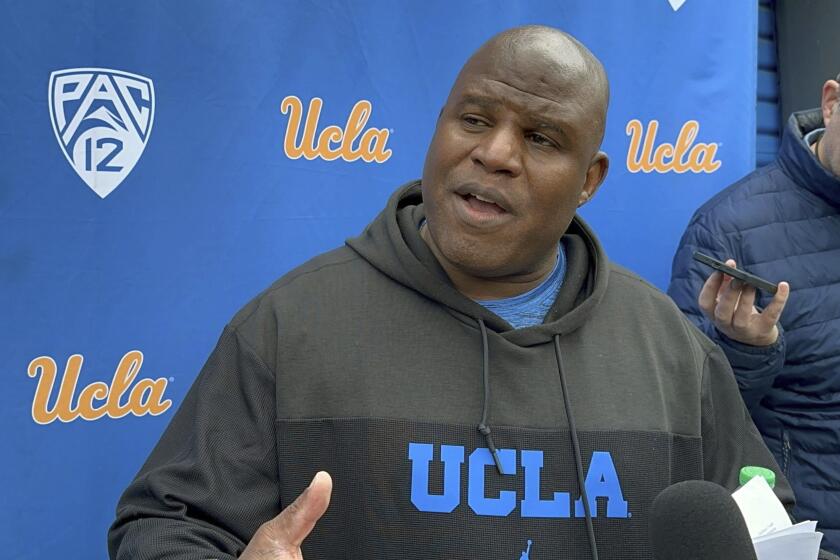To UCLA starting kicker and freshman J.J. Molson, no miss is acceptable
J .J. Molson has had his moments, few qualifying as the freshman variety.
The UCLA kicker has made seven of 10 field goals and routinely launched kickoffs through the end zone in his first college season. It sounds like a great start until Molson begins talking about his “unacceptable misses.”
Which ones were those?
“The ones that I’ve had,” Molson said. “All three.”
Molson said the 48-yard field goal he shanked against Texas A&M was a matter of improperly angling his steps leading into the kick. The same issue, Molson said, caused him to miss a 38-yard attempt against Brigham Young. Then came a failed 36-yard try against Arizona last week.
“I looked up at the play clock and I saw that it was at 12 seconds,” Molson said, “so instead of staying dialed in, I tried to rush my steps.”
The ball looked like it might tuck inside the goalpost, Molson trying to coax it by contorting his body like a golfer tracking a putt into the hole, before it bounced off the top of the left upright.
Molson called the kick the most painful of his career, discussing it as if it had cost the Bruins a victory. Instead, it was merely a blip during a 21-point win over Arizona.
“I can’t do that,” he said. “I’m the starting kicker for UCLA. Even though some people say, yeah, I’m a freshman, I know I’m better than that.”
He’s apparently intent on proving it. UCLA Coach Jim Mora said he had never seen Molson kick as well as he did in practice this week leading up to the Bruins’ game against Arizona State on Saturday at Sun Devil Stadium.
Molson confirmed that he felt more locked in and intended to avoid distractions that could shake his focus. He’s already shrugged off one memorable disruption.
As he lined up for the first kick of his college career against Texas A&M, holder Mike Fafaul told Molson to wait because the Bruins were missing a player. Sure enough, Molson looked to his left and saw guard Poasi Moala charging into position.
“I’m like, ‘Are you serious, on my first kick?’ ” Molson recalled with a smile. “But I just said to hell with it and kicked it and it went through the uprights. So that was a pretty good feeling, to be honest.”
Catching on
Rip Scherer is UCLA’s tight ends coach. In recent years, that title might have felt like holding the deed to a house that didn’t exist.
The Bruins rarely used tight ends while operating out of the spread offense under previous offensive coordinator Noel Mazzone and didn’t employ a tight ends coach. Scherer said no one on the current roster came to UCLA as a tight end except freshman Jordan Wilson, forcing coaches to pluck players from other positions as they shifted to a more pro-style offense that features as many as three tight ends.
It appears they chose well. Scherer said he recently teased the wide outs that the tight ends were the leading group of receivers on the team because they had amassed more yards than anyone else.
“We’ve made tremendous strides,” Scherer said. “We’re a lot better, not to be confused with good.”
The tight ends receded a bit into the background last week against Arizona, with Nate Iese and Caleb Wilson splitting the group’s two catches. Scherer said he was impressed by Wilson’s ability to scrap for extra yardage on his catch.
“He caught a little flat out, five yards, and made it into a 12-yard play,” Scherer said. “It looked like it was dead at five yards.”
Iese leads the tight ends with nine catches for 149 yards and a touchdown, followed by Austin Roberts’ seven catches for 73 yards.
Scherer, 64, played quarterback at William & Mary back in the early 1970s. He then coached running backs and quarterbacks and served as an offensive coordinator at a handful of schools. Head coaching stints at James Madison and Memphis preceded his becoming an associate athletic director at UCLA.
His transition back to coaching this season hasn’t been nearly as jarring as that of the players he teaches. Scherer said a tight end’s responsibilities can seem unnatural for players accustomed to relying more on speed than force.
“You’re taking some guys who have been wide receivers that have not been in that kind of physicality and trying to change their mind-set,” Scherer said, “so a lot of it is we started from ground zero and we work on fundamentals every day.”
Lasley punished
Receiver Jordan Lasley was not allowed to play against Arizona after missing a bus to the team hotel the day before the game, according to a person close to the situation not authorized to discuss it publicly.
ben.bolch@latimes.com
Twitter: @latbbolch
Go beyond the scoreboard
Get the latest on L.A.'s teams in the daily Sports Report newsletter.
You may occasionally receive promotional content from the Los Angeles Times.




